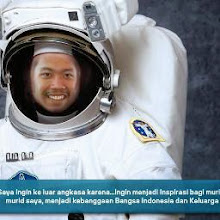Add and Edited By:
Arip Nurahman
Indonesia University of Education
and
Follower Open Course Ware at Massachusetts Institute of Technology, Cambridge.
USA
Astrophysics is the branch of astronomy that deals with the physics of the universe, including the physical properties (luminosity, density, temperature, and chemical composition) of celestial objects such as stars, galaxies, and the interstellar medium, as well as their interactions. The study of cosmology is theoretical astrophysics at scales much larger than the size of particular gravitationally-bound objects in the universe.
Because astrophysics is a very broad subject, astrophysicists typically apply many disciplines of physics, including mechanics, electromagnetism, statistical mechanics, thermodynamics, quantum mechanics, relativity, nuclear and particle physics, and atomic and molecular physics. In practice, modern astronomical research involves a substantial amount of physics.
The name of a university's department ("astrophysics" or "astronomy") often has to do more with the department's history than with the contents of the programs. Astrophysics can be studied at the bachelors, masters, and Ph.D. levels in aerospace engineering, physics, or astronomy departments at many universities.
The name of a university's department ("astrophysics" or "astronomy") often has to do more with the department's history than with the contents of the programs. Astrophysics can be studied at the bachelors, masters, and Ph.D. levels in aerospace engineering, physics, or astronomy departments at many universities.
Contents
- 1 History
- 2 Becoming an astrophysicist
- 3 Observational astrophysics
- 4 Theoretical astrophysics
- 5 See also
- 6 References
- 7 External links
Founded in 1983, the Fermilab Theoretical Astrophysics Group consists of approximately 15 theoretical astrophysicists who perform research at the confluence of astrophysics, cosmology, and particle physics. The group is partially funded by a NASA Astrophysics Theory grant. Since its inception, the group has prepared over 1000 papers for publication.
|
Searching for Strong Lenses ...
workshop @ Fermilab June 13-14, 2007.
Our weekly journal club or Munch takes place every Monday at 12:30PM in the conference room on 6W. Join us!
workshop @ Fermilab June 13-14, 2007.
Our weekly journal club or Munch takes place every Monday at 12:30PM in the conference room on 6W. Join us!
The Theoretical Astrophysics Center includes faculty, research scientists, postdoctoral researchers, and students working on a wide variety of problems in theoretical astrophysics. Our specialties include cosmology, planetary dynamics, the interstellar medium, star and planet formation, and compact objects. If you have any questions, feel free to contact anyone in our group by email. If you have a general inquiry, however, please first try Natasha Singh, the TAC's Administrative Assistant, at natasha@astro.berkeley.edu.
|
TAC Members
Faculty
Research Scientists
Postdoctoral Researchers
Graduate Students
Support Staff
Former TAC Fellows
Research
Cosmology
Stars, Planets, & Disks
High Energy Astrophysics
Faculty
Research Scientists
Postdoctoral Researchers
Graduate Students
Support Staff
Former TAC Fellows
Research
Cosmology
Stars, Planets, & Disks
High Energy Astrophysics
Visitor Information
Maps, Housing, Environs
Maps, Housing, Environs
Job Openings
TAC Postdoctoral Positions
TAC Postdoctoral Positions
Seminars
Monday TAC Seminar
Other Talks
Links Monday TAC Seminar
Other Talks
Astronomy Department
Physics Department
Center for Theoretical Physics
Center for Integrative Planetary Science
Lihat Juga:

























